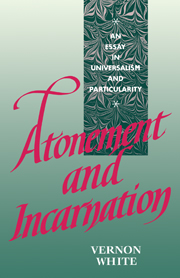Book contents
- Frontmatter
- Contents
- Introduction
- 1 The claim
- 2 On having lived too long and seen too much
- 3 The work of Christ (On trying to conceive how ‘things are not as they were’)
- 4 Two recent contributions
- 5 Creating an atonement model
- 6 The person of Christ (On trying to conceive how the Word became Flesh)
- 7 A moral demand: conditions for real reconciliation
- 8 Anthropocentricity, imperialism, and evangelism: an ethical postscript
- Notes
- Bibliography
- Index
7 - A moral demand: conditions for real reconciliation
Published online by Cambridge University Press: 21 September 2009
- Frontmatter
- Contents
- Introduction
- 1 The claim
- 2 On having lived too long and seen too much
- 3 The work of Christ (On trying to conceive how ‘things are not as they were’)
- 4 Two recent contributions
- 5 Creating an atonement model
- 6 The person of Christ (On trying to conceive how the Word became Flesh)
- 7 A moral demand: conditions for real reconciliation
- 8 Anthropocentricity, imperialism, and evangelism: an ethical postscript
- Notes
- Bibliography
- Index
Summary
The life, death, and resurrection of Jesus Christ constitute a particular experience for God which is then offered throughout all time and space with the potential to ‘save’ all peoples. This is the theological claim which I have suggested is still entirely thinkable, even in the larger world we now inhabit. What I now wish to do is take a central and crucial aspect of this saving, namely that reaction to evil which aims at reconciliation, and test it against our natural moral intuition. This will yield a powerful moral impetus behind the claim that the particular experience achieved in Christ must be universally available in some way. In other words, there is something within the moral logic of the meaning of salvation which positively drives us towards a universal application of this particular experience.
To set the scene in this way, certain basic moral and theological assumptions are made, as follows. As all major atonement models struggle to convey, salvation implies a deliverance from evil in all its various guises. Since we are all both victims and agents of evil it must mean some adequate reaction to, and overcoming of, evil within ourselves and from outside ourselves. Salvation also implies a positive goal; that for which we are being saved. As Fiddes stresses, this goal is love: right relationship with all around us; at its widest this implies right relationships with each other, as social groups, with our environment, and with God himself.
- Type
- Chapter
- Information
- Atonement and IncarnationAn Essay in Universalism and Particularity, pp. 87 - 106Publisher: Cambridge University PressPrint publication year: 1991



